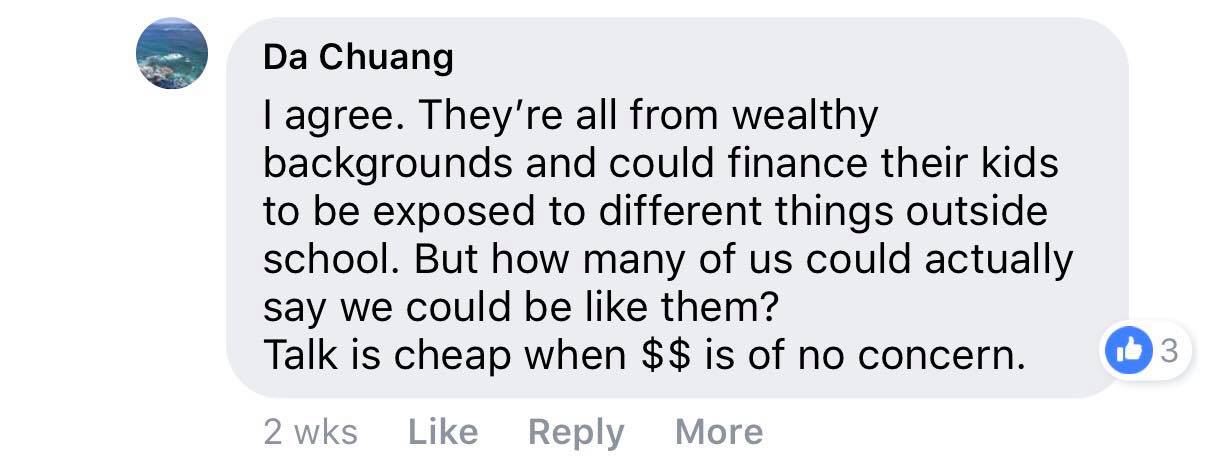Barely five minutes into meeting me, Tjin Lee, 45, asks for my PSLE score.
Um, my brain goes, before blurting out "229".
But Lee isn't really interested in my score.
What she wants is to observe my reaction -- specifically, my potential hesitation -- when it comes to revealing to another person about what I deem to be a low score.
And I say "deem to be", because Lee later reveals that 40 per cent of Singaporeans score below 200.
Furthermore, a score of 210 -- a number some of us might find unsatisfactory -- also happens to be the median score.
The mother of two -- along with four other parents, Dolores Au, Aarika Lee, Derek Ong and Charmaine Seah-Ong, are founders of the #LifeBeyondGrades campaign.
If you're curious about their grades, here is the big reveal:
Lee scored 235.
Ong and Seah-Ong, who were also at the interview, scored 226 and 218 respectively.
https://www.instagram.com/p/BnyT89eh_c2/
[related_story]
To make it clear, the campaign believes that grades are still important -- but they should never be a Singaporean's defining factor -- or worse, be the cause of suicide.
Following its launch on September 14, the #LifeBeyondGrades campaign has gone viral on Instagram, and was reported on by various media outlets (including us):
The stigma of high-scorers?
The campaign's early success in publicity did not mean that the founders had it easy.
For a start, it was difficult to get the 65 ex-students who had finally passed through the system to share their score with the public.
Surprisingly, some of the resistance came from those who had scored highly.
Lee reveals that the high scorers are sometimes sheepish about their score, which explains why they might be reluctant to share it with the public.
That was when she realised that stigma goes both ways.
"The truth is, people just feel a lot of emotion, either sometimes [they're] ashamed, or it's expectations [attached to the score] in the case of the high scorers -- even guilt."
In some of these cases, it took the founders up to three days to persuade the potential participants to take part, even sharing their own scores first so that the other person would open up.
On the other hand, some of the participants cried while writing their stories -- Pat Law, Royston Tan, and Andie Chen among them.
https://www.instagram.com/p/BnsNk7xnftU/
Reading Law's story made her tear, Lee admits.
"It took courage to write their story and put it out there."
Criticism from friends
Meaningful as the campaign might be, its founders have received their fair share of backlash.
For Seah-Ong, the criticism that hurt her the most came from reading Facebook posts by her friends and people she was close to.
"Instead of maybe reaching out to us to have a conversation about the campaign or the reason we started it, they chose to air their thoughts on social media."
But she also understands that it's how things work these days -- that people would prefer to pen their thoughts down on Facebook or Instagram, rather than have face-to-face conversations.
Misunderstanding the campaign
Similarly, some other Singaporeans who are airing their views online appear to have misunderstood the campaign.
For instance, one user on the Reddit Singapore forum shared a collage of only high scorers, with the thread title "Something about this #lifebeyondgrades campaign pisses me off":

While this is the gross misrepresentation of the campaign (which featured plenty of people with much lower scores), the user's argument is compelling too.
In essence, the thread starter believes that it is unfeasible to encourage students to "live their dream", because many families simply cannot afford to do so.
"So my son PSLE 180 study in Chai Chee Sec every day play DOTA, I should encourage him to be gamer because grades don't matter and that's his "passion"?
[...]
It's also important to note that these stories are also cherry-picked to paint a certain rosy scenario -- where parents should just chill on the grades because their kid could be the next Royston Tan. Yet statistically, how many people who never study well actually make it out? How many who made it out had good family backgrounds and support?"
Certainly his point -- and it is one that is echoed by many others -- makes sense; not everyone has the potential to become a Royston Tan or Daniel Ong.
Just to reiterate, however, the campaign recognises that grades are still important -- something that Lee emphasizes during our interview.
But the campaign founders agree that PSLE scores should not define a person, or even be used as a marker of intelligence -- much less place such disproportionate stress on our 12-year-olds that it causes mental issues.
You can nonetheless read the full argument on Reddit Singapore here.
On being elite and high-SES
As it is, other naysayers, have accused some of the founders -- especially Lee -- of being elitist.




The common complaint was that Lee (and her children) could afford to place less emphasis on grades, since they come from privileged backgrounds -- meaning that they do not have to follow well-trodden equation of good grades --> good job --> financial stability and success.
And this is a path that many of us continue to walk, especially since Singapore is a society that places much emphasis on exam meritocracy.
Following that principle, having good grades is the tried and tested way to break out of the poverty cycle.
To this, Lee does not out-rightly deny her "high-SES" (socio-economic) status.
"I think that's really not the point. [...] We're in the position that we're able, we're able, right, to drive the campaign -- and we should."
Not everyone has a voice, Lee explains, and those who are enabled and empowered should "give back" and speak up.
Similarly, there are parents from less well-to-do families who feel that they have no choice but to send their kids for tuition, in order for them to do better in school and subsequently, life.
But Lee points out that the sum spent on their kid's tuition every month -- an amount that could go up to S$1,000 -- could be saved instead.
Multiply that over the years and one should find a sizeable sum to invest in their child when they're in their 20s, Lee advises.
Success = financially well-off?
But we had one nagging question: Is "success" dependent on being financially well-off?
As it is, a common refrain by those who take part in the campaign, and those who advocate for it, is that those who didn’t do well can still find their way to success.
"Low scorers, high-flyers," as Lee puts it herself.
https://www.instagram.com/p/Bn8s2FyH83I/
https://www.instagram.com/p/Bn6KJdoH6-F/
These people go on to be entrepreneurs, corporate leaders, or respected names in their chosen field.
And from these selected stories, it seems like the definition of success remains a cliche.
That is until Seah-Ong tells us that some of the participants are actually struggling financially, although they are happy pursuing their passions.
"Happiness. Happiness is how we measure success," she says.
Being happy with your craft sounds all fine and dandy -- but what if you're not financially well-off enough to support our parents, or even buy a flat in Singapore?
At this, Lee quips that not everything can be attributed to grades.
Instead, what's more important is to be "mindful and excellent in whatever you do", and that talents can be used "in ways you never expect".
Ong chimes in, emphasising that it is crucial to posses soft skills (e.g. leadership skills, creativity) that can last a lifetime.
But perhaps the most practical quote came from Seah-Ong: "Well, you just have to accept that it [your passion] doesn't make you money."
Are parents the one contributing to the stress-driven climate?
But that is certainly not the case for our interviewees.
Lee, a high-flyer herself, founded Mercury Marketing and Communications, Singapore Fashion Week, and various other organisations/movements.
On the other hand, Seah-Ong and Ong painstakingly built Elementary Co., a local branding and marketing consultancy.
While these parents are almost predictably outstanding in their achievements, they have no plans to put their children through the pressure-cooker environment.
But this does not appear to be the typical attitude among parents these days -- at least, not from what Lee tells us.
In fact, Lee once had a problem finding a play date for her three-year-old son on a Thursday afternoon, because all the other kids were in classes.
When the other parents questioned her for not sending her three-year-old to any classes, Lee confesses that she felt judged.
Some of her friends had even messaged to ask her to consider signing up for something, as she was "losing valuable time" and "not pushing her child".
What Lee personally hopes will come out of the campaign is a reversal of situation -- one that would make others parents feel sheepish for sending their toddlers to math classes on a weekend.
To put it simply, the campaign aims to to change the system.
And by "system", Lee is not talking about the school, the curriculum, or even the Ministry of Education (MOE).
She is referring to the parents who want the best for their children.
"The parents want elite schools because you get good grades. I go to Nanyang, or RJ, I know my kid's gonna get 260, 250. So I pressure my kids. The school is then bound to deliver that 250. Don't deliver that 250, you've failed."
To reach the target score, Lee tells us, teachers single out the weaker students to tell them that they're not keeping up, and that they need more tuition.
As a result, children are struggling to keep ahead of one another in what Ong calls an "upward spiral".
To illustrate these rising expectations, Lee shares with us a conversation her friend had overhead at a taxi stand, involving four girls from a prestigious school in Singapore.
The students were commiserating over a classmate who had scored 240 for her PSLE.
According to Lee, the exact words by one of the students were, "That poor girl, she scored 240, her life is over."
Lee continues, "Wherever this young girl is, I hope she's seeing our campaign. Her life is not over."
PSLE score haunted participant for years
However, when all that is said and done, institutional change is not something that can be implemented overnight -- or even in years.
But it has to start on a personal level. And if nothing else, this campaign has achieved that.
For one of the participants who had scored below 200, telling Lee her score had been cathartic.
"I always felt stupid my whole life because of that score," the participant had said.
And this is somebody who Lee calls "clearly successful", and who has just raised 15 million dollars for the second stage of a start-up.
But her PSLE score had haunted her for years.
"I always felt like I'm faking it, I'm not really smart, and even though I'm successful today, I always think it's because other people helped me along the way because I'm not naturally smart."
And more stories like this have poured in from various social media channels, with users telling the five parents how the campaign has changed their perspective.
And Ong sums it up neatly for us: "We forgot what education is. Education and grades are two different things."
Top image courtesy of Tjin Lee, Charmaine Seah-Ong, Derek Ong, and Aarika Lee
If you like what you read, follow us on Facebook, Instagram, Twitter and Telegram to get the latest updates.
